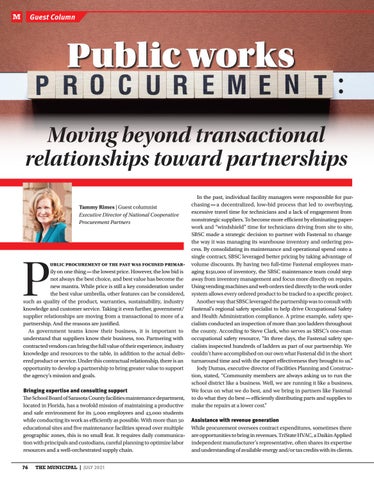M
Guest Column
Public works
:
Moving beyond transactional relationships toward partnerships Tammy Rimes | Guest columnist Executive Director of National Cooperative Procurement Partners
P
ublic procurement of the past was focused primarily on one thing — the lowest price. However, the low bid is not always the best choice, and best value has become the new mantra. While price is still a key consideration under the best value umbrella, other features can be considered, such as quality of the product, warranties, sustainability, industry knowledge and customer service. Taking it even further, government/ supplier relationships are moving from a transactional to more of a partnership. And the reasons are justified. As government teams know their business, it is important to understand that suppliers know their business, too. Partnering with contracted vendors can bring the full value of their experience, industry knowledge and resources to the table, in addition to the actual delivered product or service. Under this contractual relationship, there is an opportunity to develop a partnership to bring greater value to support the agency’s mission and goals.
Bringing expertise and consulting support The School Board of Sarasota County facilities maintenance department, located in Florida, has a twofold mission of maintaining a productive and safe environment for its 5,000 employees and 43,000 students while conducting its work as efficiently as possible. With more than 50 educational sites and five maintenance facilities spread over multiple geographic zones, this is no small feat. It requires daily communication with principals and custodians, careful planning to optimize labor resources and a well-orchestrated supply chain. 76 THE MUNICIPAL | JULY 2021
In the past, individual facility managers were responsible for purchasing — a decentralized, low-bid process that led to overbuying, excessive travel time for technicians and a lack of engagement from nonstrategic suppliers. To become more efficient by eliminating paperwork and “windshield” time for technicians driving from site to site, SBSC made a strategic decision to partner with Fastenal to change the way it was managing its warehouse inventory and ordering process. By consolidating its maintenance and operational spend onto a single contract, SBSC leveraged better pricing by taking advantage of volume discounts. By having two full-time Fastenal employees managing $150,000 of inventory, the SBSC maintenance team could step away from inventory management and focus more directly on repairs. Using vending machines and web orders tied directly to the work order system allows every ordered product to be tracked to a specific project. Another way that SBSC leveraged the partnership was to consult with Fastenal’s regional safety specialist to help drive Occupational Safety and Health Administration compliance. A prime example, safety specialists conducted an inspection of more than 300 ladders throughout the county. According to Steve Clark, who serves as SBSC’s one-man occupational safety resource, “In three days, the Fastenal safety specialists inspected hundreds of ladders as part of our partnership. We couldn’t have accomplished on our own what Fastenal did in the short turnaround time and with the expert effectiveness they brought to us.” Jody Dumas, executive director of Facilities Planning and Construction, stated, “Community members are always asking us to run the school district like a business. Well, we are running it like a business. We focus on what we do best, and we bring in partners like Fastenal to do what they do best — efficiently distributing parts and supplies to make the repairs at a lower cost.” Assistance with revenue generation While procurement oversees contract expenditures, sometimes there are opportunities to bring in revenues. TriState HVAC, a Daikin Applied independent manufacturer’s representative, often shares its expertise and understanding of available energy and/or tax credits with its clients.
